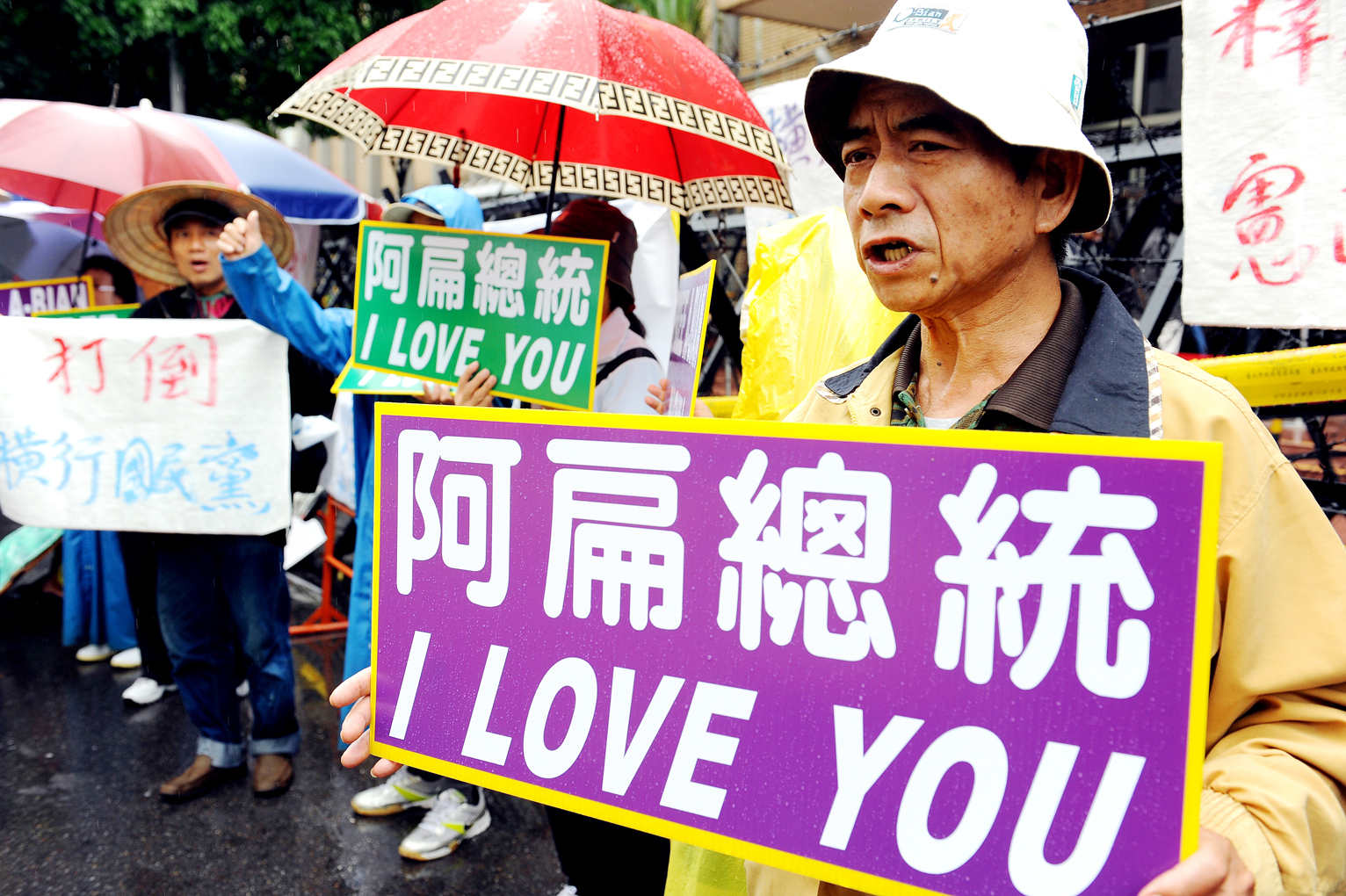The Taiwan High Court yesterday began to hear the appeal by former president Chen Shui-bian (陳水扁), who insisted his life term for graft was “illegal” and argued the evidence used to convict him was insufficient.
Chen was sentenced to life in prison by a district court last month for embezzling state funds, laundering money, accepting bribes and forgery. His wife, Wu Shu-jen (吳淑珍), also received life imprisonment on graft convictions.
Chen's defense team yesterday challenged the legitimacy of the ruling, saying the district court violated litigation laws by convicting him despite insufficient evidence.

PHOTO: CHANG CHIA-MING, TAIPEI TIMES
“The ruling is based on presumption rather than concrete evidence. It is unbalanced, illogical and biased,” his lawyer Cheng Wen-lung (鄭文龍) told a panel of High Court judges.
Cheng argued that district court judges overlooked testimonies favorable to the former president as they pointed to his wife being the mastermind of collecting political donations and wiring the family's money abroad.
Chen, whose term as president ended in May last year, has dismissed his conviction as a political vendetta by the Chinese Nationalist Party (KMT) government for his support for Taiwanese independence.
Some legal academics have expressed concern over the handling of Chen's case, particularly criticizing the length of his detention, which started last December.
Chen suffered a fresh setback last week when the Council of Grand Justices rejected a petition to halt his trial and order his immediate release from detention.

‘DENIAL DEFENSE’: The US would increase its military presence with uncrewed ships, and submarines, while boosting defense in the Indo-Pacific, a Pete Hegseth memo said The US is reorienting its military strategy to focus primarily on deterring a potential Chinese invasion of Taiwan, a memo signed by US Secretary of Defense Pete Hegseth showed. The memo also called on Taiwan to increase its defense spending. The document, known as the “Interim National Defense Strategic Guidance,” was distributed this month and detailed the national defense plans of US President Donald Trump’s administration, an article in the Washington Post said on Saturday. It outlines how the US can prepare for a potential war with China and defend itself from threats in the “near abroad,” including Greenland and the Panama

A wild live dugong was found in Taiwan for the first time in 88 years, after it was accidentally caught by a fisher’s net on Tuesday in Yilan County’s Fenniaolin (粉鳥林). This is the first sighting of the species in Taiwan since 1937, having already been considered “extinct” in the country and considered as “vulnerable” by the International Union for Conservation of Nature. A fisher surnamed Chen (陳) went to Fenniaolin to collect the fish in his netting, but instead caught a 3m long, 500kg dugong. The fisher released the animal back into the wild, not realizing it was an endangered species at

The High Prosecutors’ Office yesterday withdrew an appeal against the acquittal of a former bank manager 22 years after his death, marking Taiwan’s first instance of prosecutors rendering posthumous justice to a wrongfully convicted defendant. Chu Ching-en (諸慶恩) — formerly a manager at the Taipei branch of BNP Paribas — was in 1999 accused by Weng Mao-chung (翁茂鍾), then-president of Chia Her Industrial Co, of forging a request for a fixed deposit of US$10 million by I-Hwa Industrial Co, a subsidiary of Chia Her, which was used as collateral. Chu was ruled not guilty in the first trial, but was found guilty

The Chinese Nationalist Party (KMT) is maintaining close ties with Beijing, the Democratic Progressive Party (DPP) said yesterday, hours after a new round of Chinese military drills in the Taiwan Strait began. Political parties in a democracy have a responsibility to be loyal to the nation and defend its sovereignty, DPP spokesman Justin Wu (吳崢) told a news conference in Taipei. His comments came hours after Beijing announced via Chinese state media that the Chinese People’s Liberation Army’s Eastern Theater Command was holding large-scale drills simulating a multi-pronged attack on Taiwan. Contrary to the KMT’s claims that it is staunchly anti-communist, KMT Deputy